#The Tomorrow War (2021)
Photo

The Tomorrow War (2021)
#2020s#actor betty gilpin#dir chris mckay#dp larry fong#cat action#cat adventure#cat sci fi#cat thriller#american#brown#green eyes#tears#ponytail#collar#the tomorrow war 2021#the tomorrow war
0 notes
Text

The Tomorrow War (2021)
#2021#film#movie#science fiction#The Tomorrow War#Yvonne Strahovski#Colonel Muri Forester#Chris Pratt#Dan Forester#Keith Powers#Major Greenwood#Ryan Kiera Armstrong#Young Muri Forester#Betty Gilpin#Emmy Forester#J.K. Simmons#James Forester#Whitespikes#BCM#MK III#time travel
3 notes
·
View notes
Text
just watched dune for the first time, greig fraser the cinematography genius that you are
#i can’t wait to watch part two tomorrow#i love love LOVE his work dude holy shit#imagine having works like dune and the batman and rogue one under your belt#just incredible#i mean i think about the batman literally every day#and rogue one is my favorite star wars movie of the 2000s#these are the types of films that make me more and more excited to possibly get into this industry#greig fraser#dune#dune movie#dune 2021#dune part two#dune 2024#cinemetography#movies
2 notes
·
View notes
Text
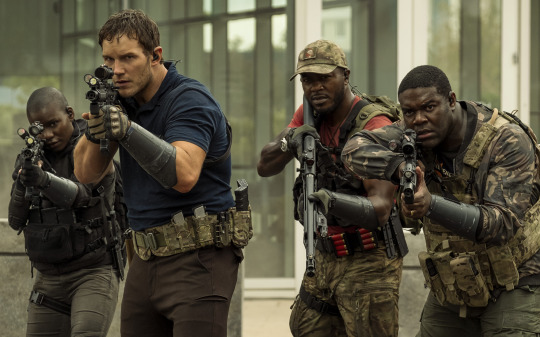
The Tomorrow War (2021) dir. Chris McKay.
7.6/10
I would recommend this movie to my friends.
I would not rewatch this movie.
I'll eat the tuna santa.
Dan immediately taking leadership after being given orders is kinda hot.
Using the helicopter blades to kill was fun.
The female ripping off her arm was pretty awesome.
I enjoy this whole snow fight. Taking on this one female is already so badass.
I'd rather fight for the world than a country.
The repetition of shits down the stairway would be me.
I feel like this could be a spinoff of the Alien franchise somehow.
Dying or being injured because you arrived wrong is terrible.
omg I teared at learning of future Muri.
Memorable Quotes:
"'Move' 'Moving'"
0 notes
Text
youtube
The Tomorrow War (2021) - Attack on Deepswell Base
0 notes
Text
Nov 6 - Cas is
Nov 11 - He’s
Nov 18 - Sam says Mia says journaling helps. Sure.
Nov 19 - Should’ve been me.
Nov 20 - Sam, if you’re reading this thing, I’ll kick your ass.
Nov 21 - Spaghetti for dinner. Cas still dead. Journaling still stupid.
Nov 24 - I should’ve said
Nov 25 - Should’ve told him.
Nov 26, Thanksgiving - Not a whole lot of thanks around here. Thanks for dying in front of me, man. Thanks for saying all that. Thanks for disappearing again before I
Nov 30 - C not back.
Dec 5 - 1 month. C gone. J quiet. S annoying.
Dec 6 - Least Sam’s alive.
Dec 8 - [drawing of Castiel, half sketched]
Dec 10 - Not much of a friggin’ artist huh.
Dec 26 - No miracle.
Dec 31 - Gonna be another year without
2021
Jan 1, New Year’s - Midnight alone. You should be here. You should
Jan 2 - I should’ve
Jan 5 - 2 months
Feb 5 - 3 months since I should’ve fucking kissed you.
Feb 28 - If this was a leap year man I bet you’d be back tomorrow you always did shit like that surprised the hell out of me.
Mar 1 - So it goes.
Mar 2 - S thought the library here had Vonnegut. Didn’t.
Mar 5 - 4 months Went to get a library card in town.
Mar 11 - “And I asked myself about the present: how wide it was, how deep it was, how much was mine to keep.”
Mar 30 - Sam might have a hunt for us. Don’t know if
Mar 31 - Turned it down. Passed it to Jody’s crew.
Apr 1, April Fool’s - Real funny C. Joke's over. Come back already.
Apr 9 - There’s things I can’t say things I’ve never been good at saying but you gotta know
Apr 29 - He didn’t know he didn’t know he didn’t know he didn’t
May 5 - You died not knowing, you asshole. 6 months and you’re not back so I can’t tell you.
May 6 - You missed Star Wars day, you know.
May 7 - Didn’t even Han you. Well I didn't know did I.
May 8 - Did I?
May 9 - Maybe I
May 26 - “How nice — to feel nothing, and still get full credit for being alive.”
June 5 - 7
July 5 - 8
Aug 5 - 9
Aug 6 - What if you don’t
Aug 10 - You missed my birthday. S’s too. J’s.
Aug 11 - If you can hear me
Aug 12 - What would he even
Sept 5 - Nearly crashed the car today. S had to drive. Banged up my head leaning on the window in the backseat like a kid. 10
Sept 6 - Researching.
Sept 7 - Ain’t fair you missed a whole year. Gonna have a lot of catch up to play when
Sept 8 - …when we get you back.
Sept 18 - Been 12 years. You believe that, Cas? Since I came back. Since you brought me back. Guess I hoped today would be the magic bullet to getting you back. Like you’d tip your head at me and say Hello Dean. And I’d tell you how I raised you from perdition. Whatever. Just a day I guess. Universe doesn’t care it’s our anniversary
Sept 19 - Still gonna say it though. When it works.
Oct 5 - 11. It’s gonna work
Oct 31, Halloween - Never got to put you in a dumb matching costume. Next year though.
Nov 4 - Can’t sleep. Sam says time is powerful magic or some shit like that. Says an anniversary can have echoes. So we’re trying it tomorrow. God, this better work. Cas, you hear me? We’re coming for you. I’ve been praying all year and I’m hearing nothing back. I’ll tell you tomorrow. Gonna get this stuck mouth of mine to make good. It’s just the words, even on paper, they don’t—Tomorrow though, tomorrow I’m telling you everything. Promise.
Nov 5 - Today.
Nov 6 - !!! 🙂🙂🙂🙂
^ heh. check out this dork
#spn#supernatural#destiel#remember remember the fifth of november#my writing#tumblr fic#em og post#wrote this at work lol
785 notes
·
View notes
Text
THE GOLDEN WAR

pairings: alexia putellas x lyonnais!reader
warnings: swearing. for culers the ‘22 uwcl final ig. jona is kinda mean in this.
author’s note: this is the same reader from my ‘one for the money, two for the show’ fic of the lionesses!captain. reader is basically ada hegerberg lolsies :) will be turned into a series.
masterlist
•••••
Turin, Italy - May, 2022
''The final has been dubbed as a duel between you and Alexia Putellas, do you experience it as that?''
The Lyon captain fought the urge to roll her eyes at the question, despite having expected it. ''It is a final between Barcelona and Lyon, nothing more than that.'' She answered, diplomatically- the way they had rehearsed it.
''Lyon is the underdog coming into this final- FC Barcelona has been unbeatable so far. What do you need to do in order to beat them tomorrow?'' Another reporter asked, a pen ready in his hand to take notes.
There was a slight change in her expression as the question left his lips, the man succeeding in poking through her stoic expression. ''Well, we have never lost to Barcelona- I don't know if you remember 3 years ago or even last year,''
Lyon had comfortably beaten the Spanish club in 2019. In that Champions League Final, Y/N had become the first player to score a hattrick in a UWCL final. Their last meeting had been in 2021, in the pre-season, where Lyon had won 3-2, the Lyon captain again putting one in the net.
''We have won this competition many times. There was football before Barcelona, and it was being played by us.''
Her last sentence of the quote had struck a nerve with the Barça captain.
''She acts like she has already won the whole thing.'' Alexia remarked as she read a transcript of the press conference.
Patri and Mapi glanced at one another, a knowing look in their eyes. ''Technically, there is nothing wrong about what she said, Ale. How many times has she won this competition now? 6? 7?'' The defender said, not having a problem with the opposition's words.
''She's just pissed that everyone is talking about us now.'' She ignored Mapi, continuing berating her opponent.
The rivalry between the captains of the two top teams had been something made up by the media, seeking a female counterpart to the famed Ronaldo-Messi rivalry. Both Alexia and Y/N led Europe's premier clubs, won the Champions League, captained their national teams, and earned the Ballon d'Or. This fueled incessant comparisons.
Alexia and Y/N hadn't given it much thought at first. There were also many differences between them; Alexia is a midfielder, while Y/N is a striker. Despite their similar ages, their careers took diverse paths. Alexia remained in the Spanish league, while Y/N gained experience across various countries.
Over time, an unexpected shift occurred. They began caring about each other's achievements. Yet, they knew the comparison wasn't fair.
Despite being younger, Y/N dominated women's football for longer, winning the Champions League seven times – twice with Wolfsburg and five times with Lyon. In contrast, Alexia secured one with Barcelona. Neither had won anything major with their national teams, though she had come close with England a few times. Furthermore, on the accolades side of things, Y/N led with a repertoire that most players could only dream of.
For a long time, it hadn't bothered Alexia. She had watched in admiration as the younger player became the first recipient of the Ballon d'Or, a huge step in women's football. Y/N's advocacy for the sport also didn't escape the Spanish player.
However, her admiration had turned into envy.
The turning point came in the 2019 final against Lyon. She had observed the way the English striker had celebrated with her entire team- how the Lyon squad immediately ran to her once the whistle blew and how Y/N bathed in all the (rightly deserved) glory. Alexia wanted that for herself. For years, Y/N had been the nail in Barcelona's coffin, scoring the goals that made sure they couldn't continue in the competition- in the captain's opinion, the striker had made a joke of her team for years, even if she didn't meant to do that.
Their interactions over the years were limited to polite handshakes before or after matches. Occasional encounters outside the pitch were rare and brief, seldom extending beyond a few sentences.
Alexia's surprise peaked when Y/N congratulated her on winning the Ballon d'Or through both private and public Instagram messages. Despite her reservations about comparisons and rivalry, receiving praise from someone she admired as one of the best in the game left Alexia with a positive feeling.
''No, I think she's just not a fan of being referred to as an underdog.'' Patri defended the Lyon striker.
This explanation didn't sit well with Alexia, evident from the displeasure on her face. ''Whatever,'' she retorted, looking forward to settling matters on the field that Saturday.

Saturday, May 21, 2022
Excitement, adrenaline, nerves, and tension permeated the tunnel of Juventus Stadium as Alexia, tightly gripping her pennant, stood at the front of her lined-up team, awaiting the opposing captain.
The sudden hush among the Barcelona team signaled the arrival of their counterpart. Turning around, Alexia frowned at her teammates' fascination with the approaching striker.
This is not the time to be fangirling, she thought to herself, as she saw most of her players' eyes following the striker's figure.
As the two top players faced each other, uncertainty lingered about whether they should exchange greetings. Y/N broke the silence, deciding to offer some acknowledgment. ''Hey, you alright?'' Her charming English accent filled the air.
''Yeah, and you?'' Alexia almost cringed at her own quick response, not giving her brain time to think.
''I‘ll see in about 90 minutes.'' The younger one grinned.
I'll wipe that smirk off your fucking face, Alexia said in her mind, not a fan of the confidence the striker was oozing.
Ten minutes later, the referee blew the whistle, signaling the start of the highly-anticipated final.
Lyon applied intense pressure right from the start, managing to create two goal-scoring opportunities within the first three minutes of the match.
However, the audience were offered their first initial glimpse of the rivalry in the 6th minute of the game.
Y/N positioned herself strategically, eyes fixed on her teammate readying a precise pass to her. The ball zipped across the pitch, and in a heartbeat, both Y/N and Alexia were locked onto winning it for themselves.
The striker, a master of timing, surged forward. Simultaneously, the midfielder closed in on the target. The collision was inevitable.
Both players fell with a thud, groaning at the contact with the ground. Despite the force of the clash, they both showed resilience as they wanted to use the momentum to their advantage.
They were momentarily entangled, fighting for control of the ball. It was a brief display of the rivalry that had brewed between them.
Y/N rose swiftly from the turf, eyes filled with determination. The collision had only fueled her competitive fire. With the ball firmly at her feet, she accelerated away from the mess, leaving Alexia behind.
The crowd erupted in gasps and cheers as Y/N, now in open space, scanned the field. Seizing the opportunity, she unleashed a powerful strike from well outside the box.
Time seemed to slow as the ball sailed towards the goal. Panos's desperate dive was in vain as the ball found the back of the net. The roar of the crowd echoed through the stadium, a symphony of cheers and applause for a goal that showcased the skills and spirit of the Lyon captain.
A fleeting scowl crossed Alexia's face, frustrated at the missed opportunity.
Y/N turned on her heels as the net rippled, ready to embrace her teammates who were rushing to her.
''Vamos!'' She roared, the Spanish word escaping her lips like a battle cry.
Yet, she found herself face-to-face not with the familiar sight of Lyon jerseys but with the intensity of Alexia's determined gaze.
Her expression froze for a quick second, confusion adorning her features. Y/N's eyes widened in realization, and for a brief instant, the two captains locked eyes in an unspoken exchange.
The celebration continued around them, teammates engulfing Y/N as they screamed with delight at their captain's prolific opener. The air was filled with jubilation, but within the chaos, the tension lingered between the two captains, adding an intriguing layer to the unfolding drama on the pitch.
The match unfolded further, Barcelona grabbing a few opportunities of their own, but not being clinical enough to score an equalizer. The Spanish squad remained calm, showing no signs of panic in their play, despite being behind.
Selma and Melvine played a great one-two with each other, and the young defender shot a beautiful cross towards the box. Anticipating the trajectory of the ball, Y/N skillfully pulled away from Leon, who undoubtedly had the impossible task of marking the striker.
The ball connected with Y/N's forehead, falling perfectly into the mesh. The scoreboard illuminated with Lyon 2, Barcelona 0. The narrative had shifted as the favorites stomped the ground in frustration, while the ''underdogs'' celebrated another goal from their captain.
The first half flew by. Y/N managed to assist Catarina to make it 3-0, but Alexia found the back of the net to get one back.
3-1.
The second half saw more scoring opportunities for Barcelona, but no one managed to finish the job.
After contact with Martens, Griedge cited experiencing a cramp and asked for treatment- a request that the Barcelona side was not having. Y/N, understanding the frustration of time-wasting, especially when behind in a match, stood aside.
However, the Lyon captain didn't appreciate the scolding she received from the opposition's coach. ''Tell your player to stop the comedy, what a shit job!'' Jonatan exclaimed to the English captain, who observed the scene from the sideline.
Y/N didn't budge, paying him no attention, knowing it was all tactics. She gave an unimpressed look toward the referee, who had been observing the one-sided interaction.
The official ran up to them, pulling a yellow card from her pocket and holding it in front of the manager. ''Step back, please. Don't talk to the opposition.'' she instructed him.
The match eventually resumed. In extra time, Paredes almost managed to pull off a header, but it went flying over the post.
In the last minute of the game, Y/N teamed up with Eugénie to score a last-minute beauty, but the volley slammed against the post.
The piercing sound of the referee's whistle resonated through the stadium, marking the conclusion of the final. Lyon emerged triumphant for a record-extending 8th time.
Overwhelmed by her own emotions, Y/N fell to the ground as the whistle echoed in her ears. It didn't take too long for her teammates to rush up to her, colliding in a chaos of hugs, kisses, and jubilant shouts.
They had done it again, proving once more why all the records were tied to their name.
''Y/N, you're a fucking legend!'' Lindsey yelled in her ear, kissing her cheek multiple times.
As her teammates slowly got up from their celebratory cuddle with the ground, they formed a protective circle around their captain. Hands reached out to help her rise from the grass, and she found herself enveloped in a symphony of gratitude.
Eventually, she shook off her glorious daze, a wide grin etched on her face.
Y/N turned her attention to the defeated Barcelona players, spread out across the field with tears and disappointment staining their cheeks. She approached them, offering a helping hand to those still on the ground and sharing comforting words. Acknowledging the effort they had brought, she assured them that they gave her team a greater fight than the scoreline implied.
Before the Lyon squad embarked on their victory lap to greet the traveling supporters, Y/N's gaze fell on a heartbreaking scene. Across the field, the Spanish captain, Alexia, was cradled in a comforting embrace by a Barcelona staff member as tears streamed down her face.
Y/N hesitated, caught in a ''should I or shouldn't I'' moment with herself.
She chose to make an attempt to resolve whatever tension had built up between them.
Tears glistened on Alexia's cheeks, a testament to the intensity of the match and the dreams left unfulfilled. The Barcelona staff member, offering solace in the face of defeat, glanced up as Y/N approached, and let go of her.
''Alexia,'' Y/N greeted her softly, putting her arm around the Spaniard, ''thank you for the great battle.'' She hadn't prepared what to say, because what do you say against someone you feel like you are supposed to hate? What do you say against someone you've been constantly compared to for over a year?
To the striker's surprise, Alexia reciprocated, feeling an arm on her lower-back. ''Congratulations, you deserved the win. You played phenomenal.'' The midfielder told her, a forced yet genuine small smile making a way onto her face.
''Don't let this hurt you. You are literally one of the best players I have played against- your team is amazing. Use this, like in 2019.'' Y/N advised her, not particularly caring if the opposing player would take it or not.
''We will. I hope we can play many more finals. You make me- you make us grow.'' Alexia stuttered.
Y/N nodded. ''I hope so too. It's been fascinating to see the growth you guys have made these last years.''
The stadium now bore witness to a quieter exchange between the two captains. Almost every camera lens and watchful eye fixated on them.
As Y/N and Alexia exchanged words of mutual respect, their moment of shared understanding was abruptly disrupted by the Barcelona coach.
''Congratulations on the win, Y/N.'' He acknowledged briskly, his gaze quickly turning toward Alexia. His extended hand to her seemed more like a formality, but Y/N accepted it.
Almost forcibly, he placed a hand on Alexia's shoulder, a non-verbal cue that spoke volumes. ''Come on.'' He declared, his tone leaving little room for negotiation and they were off to wherever he needed her to be.
Alexia casted an immediate glance back at Y/N, a mix of emotions played across her face- gratitude for the moment, and frustration at its abrupt end. She hadn't responded to her words yet.
As the Spaniard was led away, Y/N's eyes lingered on the departing figure, a tinge of melancholy in her gaze.
The brief encounter had sparked a momentary connection- a bridge attempting to break through the perceived rivalry and show praise for a strong opponent. However, Jonatan's swift intervention acted like a pair of scissors, cutting through the threads that held that connection.
In Y/N's mind, Alexia had seemed appreciative of the opportunity to have a genuine conversation. She figured there must have been a good reason for her to have been pulled away like that, especially by the head coach.
The Barcelona captain had reacted with a hint of irritation when her coach suggested to the Lyon player to remove her arm from Alexia's shoulder. She tried asking Jonatan why he had coaxed her away, but she didn't receive a proper answer.
The whole thing had left a bitter taste in her mouth. The potential for a more extended, sincere exchange was cut short, leaving Alexia with lingering frustration. There was a desire to understand Y/N beyond the competition, but it was cut short.
She hoped her last glance had worked as a silent acknowledgment of what could have been.

794 notes
·
View notes
Text
Brian Merchant’s “Blood In the Machine”
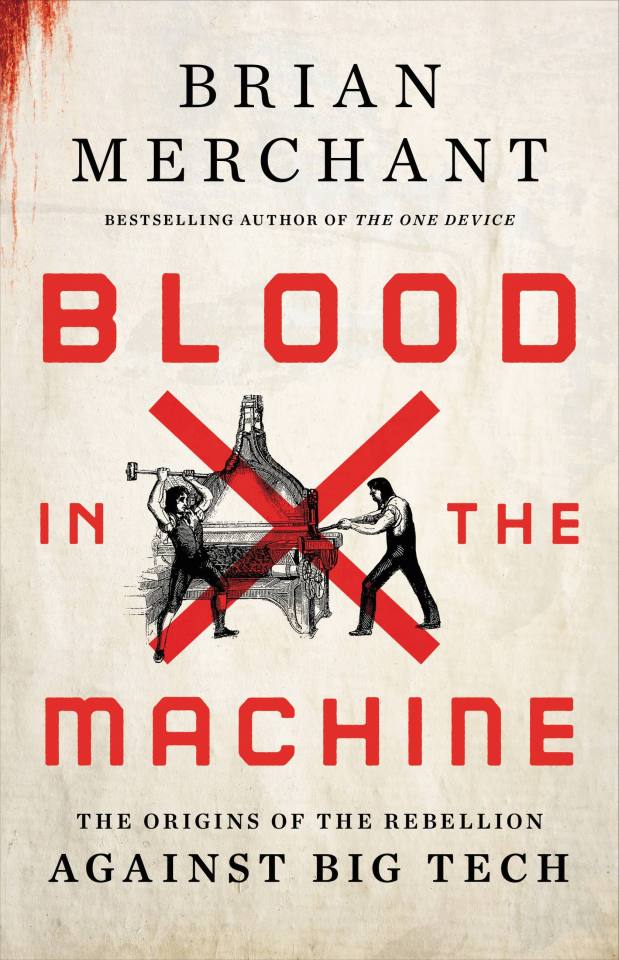
Tomorrow (September 27), I'll be at Chevalier's Books in Los Angeles with Brian Merchant for a joint launch for my new book The Internet Con and his new book, Blood in the Machine. On October 2, I'll be in Boise to host an event with VE Schwab.

In Blood In the Machine, Brian Merchant delivers the definitive history of the Luddites, and the clearest analysis of the automator's playbook, where "entrepreneurs'" lawless extraction from workers is called "innovation" and "inevitable":
https://www.littlebrown.com/titles/brian-merchant/blood-in-the-machine/9780316487740/
History is written by the winners, and so you probably think of the Luddites as brainless, terrified, thick-fingered vandals who smashed machines and burned factories because they didn't understand them. Today, "Luddite" is a slur that means "technophobe" – but that's neither fair, nor accurate.
Luddism has been steadily creeping into pro-labor technological criticism, as workers and technology critics reclaim the term and its history, which is a rich and powerful tale of greed versus solidarity, slavery versus freedom.
The true tale of the Luddites starts with workers demanding that the laws be upheld. When factory owners began to buy automation systems for textile production, they did so in violation of laws that required collaboration with existing craft guilds – laws designed to ensure that automation was phased in gradually, with accommodations for displaced workers. These laws also protected the public, with the guilds evaluating the quality of cloth produced on the machine, acting as a proxy for buyers who might otherwise be tricked into buying inferior goods.
Factory owners flouted these laws. Though the machines made cloth that was less durable and of inferior weave, they sold it to consumers as though it were as good as the guild-made textiles. Factory owners made quiet deals with orphanages to send them very young children who were enslaved to work in their factories, where they were routinely maimed and killed by the new machines. Children who balked at the long hours or attempted escape were viciously beaten (the memoir of one former child slave became a bestseller and inspired Oliver Twist).
The craft guilds begged Parliament to act. They sent delegations, wrote petitions, even got Members of Parliament to draft legislation ordering enforcement of existing laws. Instead, Parliament passed laws criminalizing labor organizing.
The stakes were high. Economic malaise and war had driven up the price of life's essentials. Workers displaced by illegal machines faced starvation – as did their children. Communities were shattered. Workers who had apprenticed for years found themselves graduating into a market that had no jobs for them.
This is the context in which the Luddite uprisings began. Secret cells of workers, working with discipline and tight organization, warned factory owners to uphold the law. They sent letters and posted handbills in which they styled themselves as the army of "King Ludd" or "General Ludd" – Ned Ludd being a mythical figure who had fought back against an abusive boss.
When factory owners ignored these warnings, the Luddites smashed their machines, breaking into factories or intercepting machines en route from the blacksmith shops where they'd been created. They won key victories, with many factory owners backing off from automation plans, but the owners were deep-pocketed and determined.
The ruling Tories had no sympathy for the workers and no interest in upholding the law or punishing the factory owners for violating it. Instead, they dispatched troops to the factory towns, escalating the use of force until England's industrial centers were occupied by literal armies of soldiers. Soldiers who balked at turning their guns on Luddites were publicly flogged to death.
I got very interested in the Luddites in late 2021, when it became clear that everything I thought I knew about the Luddites was wrong. The Luddites weren't anti-technology – rather, they were doing the same thing a science fiction writer does: asking not just what a new technology does, but also who it does it for and who it does it to:
https://locusmag.com/2022/01/cory-doctorow-science-fiction-is-a-luddite-literature/
Unsurprisingly, ever since I started publishing on this subject, I've run into people who have no sympathy for the Luddite cause and who slide into my replies to replicate the 19th Century automation debate. One such person accused the Luddites of using "state violence" to suppress progress.
You couldn't ask for a more perfect example of how the history of the Luddites has been forgotten and replaced with a deliberately misleading account. The "state violence" of the Luddite uprising was entirely on one side. Parliament, under the lackadaisical leadership of "Mad King George," imposed the death penalty on the Luddites. It wasn't just machine-breaking that became a capital crime – "oath taking" (swearing loyalty to the Luddites) also carried the death penalties.
As the Luddites fought on against increasingly well-armed factory owners (one owner bought a cannon to use on workers who threatened his machines), they were subjected to spectacular acts of true state violence. Occupying soldiers rounded up Luddites and suspected Luddites and staged public mass executions, hanging them by the dozen, creating scores widows and fatherless children.
The sf writer Steven Brust says that the test to tell whether someone is on the right or the left is simple: ask whether property rights are more important than human rights. If the person says "property rights are human rights," they are on the right.
The state response to the Luddites crisply illustrates this distinction. The Luddites wanted an orderly and lawful transition to automation, one that brought workers along and created shared prosperity and quality goods. The craft guilds took pride in their products, and saw themselves as guardians of their industry. They were accustomed to enjoying a high degree of bargaining power and autonomy, working from small craft workshops in their homes, which allowed them to set their own work pace, eat with their families, and enjoy modest amounts of leisure.
The factory owners' cause wasn't just increased production – it was increased power. They wanted a workforce that would dance to their tune, work longer hours for less pay. They wanted unilateral control over which products they made and what corners they cut in making those products. They wanted to enrich themselves, even if that meant that thousands starved and their factory floors ran red with the blood of dismembered children.
The Luddites destroyed machines. The factory owners killed Luddites, shooting them at the factory gates, or rounding them up for mass executions. Parliament deputized owners to act as extensions of law enforcement, allowing them to drag suspected Luddites to their own private cells for questioning.
The Luddites viewed property rights as just one instrument for achieving human rights – freedom from hunger and cold – and when property rights conflicted with human rights, they didn't hesitate to smash the machines. For them, human rights trumped property rights.
Their bosses – and their bosses' modern defenders – saw the demands to uphold the laws on automation as demands to bring "state violence" to bear on the wholly private matter of how a rich man should organize his business. On the other hand, literal killing – both on the factory floor and at the gallows – was not "state violence" but rather, a defense of the most important of all the human rights: the rights of property owners.
19th century textile factories were the original Big Tech, and the rhetoric of the factory owners echoes down the ages. When tech barons like Peter Thiel say that "freedom is incompatible with democracy," he means that letting people who work for a living vote will eventually lead to limitations on people who own things for a living, like him.
Then, as now, resistance to Big Tech enjoyed widespread support. The Luddites couldn't have organized in their thousands if their neighbors didn't have their backs. Shelley and Byron wrote widely reproduced paeans to worker uprisings (Byron also defended the Luddites in the House of Lords). The Brontes wrote Luddite novels. Mary Shelley's Frankenstein was a Luddite novel, in which the monster was a sensitive, intelligent creature who merely demanded a say in the technology that created him.
The erasure of the true history of the Luddites was a deliberate act. Despite the popular and elite support the Luddites enjoyed, the owners and their allies in Parliament were able to crush the uprising, using mass murder and imprisonment to force workers to accept immiseration.
The entire supply chain of the textile revolution was soaked in blood. Merchant devotes multiple chapters to the lives of African slaves in America who produced the cotton that the machines in England wove into cloth. Then – as now – automation served to obscure the violence latent in production of finished goods.
But, as Merchant writes, the Luddites didn't lose outright. Historians who study the uprisings record that the places where the Luddites fought most fiercely were the places where automation came most slowly and workers enjoyed the longest shared prosperity.
The motto of Magpie Killjoy's seminal Steampunk Magazine was: "Love the machine, hate the factory." The workers of the Luddite uprising were skilled technologists themselves.
They performed highly technical tasks to produce extremely high-quality goods. They served in craft workshops and controlled their own time.
The factory increased production, but at the cost of autonomy. Factories and their progeny, like assembly lines, made it possible to make more goods (even goods that eventually rose the quality of the craft goods they replaced), but at the cost of human autonomy. Taylorism and other efficiency cults ended up scripting the motions of workers down to the fingertips, and workers were and are subject to increasing surveillance and discipline from their bosses if they deviate. Take too many pee breaks at the Amazon warehouse and you will be marked down for "time off-task."
Steampunk is a dream of craft production at factory scale: in steampunk fantasies, the worker is a solitary genius who can produce high-tech finished goods in their own laboratory. Steampunk has no "dark, satanic mills," no blood in the factory. It's no coincidence that steampunk gained popularity at the same time as the maker movement, in which individual workers use form digital communities. Makers networked together to provide advice and support in craft projects that turn out the kind of technologically sophisticated goods that we associate with vast, heavily-capitalized assembly lines.
But workers are losing autonomy, not gaining it. The steampunk dream is of a world where we get the benefits of factory production with the life of a craft producer. The gig economy has delivered its opposite: craft workers – Uber drivers, casualized doctors and dog-walkers – who are as surveilled and controlled as factory workers.
Gig workers are dispatched by apps, their faces closely studied by cameras for unauthorized eye-movements, their pay changed from moment to moment by an algorithm that docks them for any infraction. They are "reverse centaurs": workers fused to machines where the machine provides the intelligence and the human does its bidding:
https://pluralistic.net/2021/02/17/reverse-centaur/#reverse-centaur
Craft workers in home workshops are told that they're their own bosses, but in reality they are constantly monitored by bossware that watches out of their computers' cameras and listens through its mic. They have to pay for the privilege of working for their bosses, and pay to quit. If their children make so much as a peep, they can lose their jobs. They don't work from home – they live at work:
https://pluralistic.net/2021/01/22/paperback-writer/#toothless
Merchant is a master storyteller and a dedicated researcher. The story he weaves in Blood In the Machine is as gripping as any Propublica deep-dive into the miserable working conditions of today's gig economy. Drawing on primary sources and scholarship, Blood is a kind of Nomadland for Luddites.
Today, Merchant is the technology critic for the LA Times. The final chapters of Blood brings the Luddites into the present day, finding parallels in the labor organizing of the Amazon warehouse workers led by Chris Smalls. The liberal reformers who offered patronizing support to the Luddites – but didn't imagine that they could be masters of their own destiny – are echoed in the rhetoric of Andrew Yang.
And of course, the factory owners' rhetoric is easily transposed to the modern tech baron. Then, as now, we're told that all automation is "progress," that regulatory evasion (Uber's unlicensed taxis, Airbnb's unlicensed hotel rooms, Ring's unregulated surveillance, Tesla's unregulated autopilot) is "innovation." Most of all, we're told that every one of these innovations must exist, that there is no way to stop it, because technology is an autonomous force that is independent of human agency. "There is no alternative" – the rallying cry of Margaret Thatcher – has become our inevitablist catechism.
Squeezing the workers' wages conditions and weakening workers' bargaining power isn't "innovation." It's an old, old story, as old as the factory owners who replaced skilled workers with terrified orphans, sending out for more when a child fell into a machine. Then, as now, this was called "job creation."
Then, as now, there was no way to progress as a worker: no matter how skilled and diligent an Uber driver is, they can't buy their medallion and truly become their own boss, getting a say in their working conditions. They certainly can't hope to rise from a blue-collar job on the streets to a white-collar job in the Uber offices.
Then, as now, a worker was hired by the day, not by the year, and might find themselves with no work the next day, depending on the whim of a factory owner or an algorithm.
As Merchant writes: robots aren't coming for your job; bosses are. The dream of a "dark factory," a "fully automated" Tesla production line, is the dream of a boss who doesn't have to answer to workers, who can press a button and manifest their will, without negotiating with mere workers. The point isn't just to reduce the wage-bill for a finished good – it's to reduce the "friction" of having to care about others and take their needs into account.
Luddites are not – and have never been – anti-technology. Rather, they are pro-human, and see production as a means to an end: broadly shared prosperity. The automation project says it's about replacing humans with machines, but over and over again – in machine learning, in "contactless" delivery, in on-demand workforces – the goal is to turn humans into machines.
There is blood in the machine, Merchant tells us, whether its humans being torn apart by a machine, or humans being transformed into machines.
Brian and I are having a joint book-launch tomorrow night (Sept 27) at Chevalier's Books in Los Angeles for my new book The Internet Con and his new book, Blood in the Machine:
https://www.eventbrite.com/e/the-internet-con-by-cory-doctorow-blood-in-the-machine-by-brian-merchant-tickets-696349940417

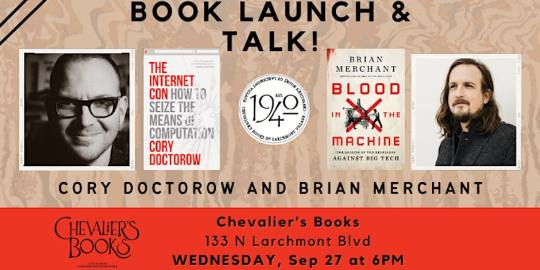

If you'd like an essay-formatted version of this post to read or share, here's a link to it on pluralistic.net, my surveillance-free, ad-free, tracker-free blog:
https://pluralistic.net/2023/09/26/enochs-hammer/#thats-fronkonsteen
#pluralistic#books#reviews#brian merchant#luddism#automation#history#gift guide#steampunk#makers#tina#inevitablism#reverse centaurs#amazon#arise
546 notes
·
View notes
Text
(JTA) — Vivian Silver, a Canadian-Israeli peace activist who had been presumed kidnapped by Hamas, was declared dead after her remains were found at her home.
Her death was confirmed to JTA by multiple activists who said they were in touch with Silver’s family. Shifra Bronznick, a prominent Jewish social justice activist and lifelong friend of Silver’s, learned from Silver’s son that her remains were identified via her DNA.
“Vivian was always persistent in the pursuit of peace and justice,” Bronznick told JTA on Monday evening. “She was a lifelong feminist, a committed activist, a fearless leader, an exceptional friend and a loving mother, wife and grandmother.”
Until Monday, Silver, 74, was assumed to be among the more than 200 people held captive by Hamas. She is now among the approximately 1,200 people murdered by the terror group in its Oct. 7 attack. Hamas terrorists killed more than 100 people at Silver’s home community, Kibbutz Be’eri, in one of the day’s worst massacres.
She is one of several peace activists to have been killed or captured by Hamas on Oct. 7. Hayim Katsman, 32, who worked with Palestinians in the southern West Bank, was killed in his home in another community on the Gaza border. Yocheved Lifschitz, who helped ferry Palestinians from Gaza to medical care in Israel, was taken captive by Hamas and released in late October; her husband Oded, also involved in peace work, remains missing.
“A woman of infinite, deep, ongoing compassion, humanity and dedication to Arab-Jewish partnership and peace. Yes. Peace,” Anat Saragusti, an Israeli writer and feminist activist, wrote on social media in a post announcing Silver’s death. John Lyndon, the executive director of the Alliance for Middle East Peace, wrote that “she wanted to be free & at peace. Rest in power, Vivian.”
Silver’s sons, like the family members of many of those presumed hostage, lobbied extensively for her release, traveling the country and speaking to journalists around the world to call attention to her story. One son, Yonatan Zeigen, stood out for his calls for a ceasefire, an unusual position in Israel. He said he had learned from his mother to seek peace above all else.
“I would tell her, ‘Israel is dead. It’s hopeless,’ and she would say, ‘Peace could come tomorrow,’” Yonatan, a social worker in Tel Aviv told the Washington Post in a story published last week.
Chen Zeigen, her other son, is a doctoral student in archaeology at the University of Connecticut. She is also survived by four grandchildren.
On the day of the massacre, according to the Washington Post story, Silver took a call with a radio station where she pushed back against the idea that the Palestinians were “insane.” In messages with Yonatan, she expressed fear, frustration and love. “I’m with you,” he wrote to her. Her last message back to him was, “I feel you.”
Born in Winnipeg, Canada, she was the longtime director of the Arab Jewish Center For Empowerment, Equality, and Cooperation, which organized projects joining communities in Israel, the Gaza Strip and the West Bank. In 2014, after the last major war between Israel and Hamas, she helped found Women Wage Peace, which promotes peace-building actions among women from all communities and across the political spectrum.
Speaking to Forbes in 2021 for a series on women who assist the vulnerable, Silver said she remembered feeling relief after the government built bomb shelters in Kibbutz Be’eri, which had been subject to rocket fire from Gaza for more than a decade.
“In 2009, the [Israeli] government only built shelters for communities that were four kilometers from the border. The community I live in is four and a half kilometers from the border, so we didn’t have shelters then,” Silver told Forbes. “Now we do, so psychologically we feel better, and we feel safer, and in fact, we are safer, we’re a lot safer than the people in Gaza.”
At a 2018 Women Wage Peace event on the Gaza border in 2018, she said that the Israeli government needed to change its approach in order to bring peace to the area. “Show the required courage that will bring changes of policy that will bring us quiet and security,” she said then, addressing the government. “Returning to the routine is not an option.”
Appealing to women across the border, she said, “Terror does not make anything better for anyone, you too deserve quiet and peace.”
Bronznick first met Silver in the early 1970s when both were involved in organizing a national conference of Jewish women. They remained friends and, for a period of six years, took an annual trip together — the last one was to Santa Fe, New Mexico. When Silver would stay at Bronznick’s home, she would prepare an Israeli breakfast, Bronznick recalled.
“She would be passionately advocating for peace right now,” Bronznick said, referring to Israel’s war against Hamas, launched following the Oct. 7 attack. “She never gave up on bridge-building. She never gave up on making change. She never gave up on people… She always focused on people, children, what motivated them, what meant something to them.”
Before Oct. 7, Silver was due for another stay at Bronznick’s home in New York City in early December. On top of each of the days in Bronznick’s calendar, she had written “Viv.”
268 notes
·
View notes
Text




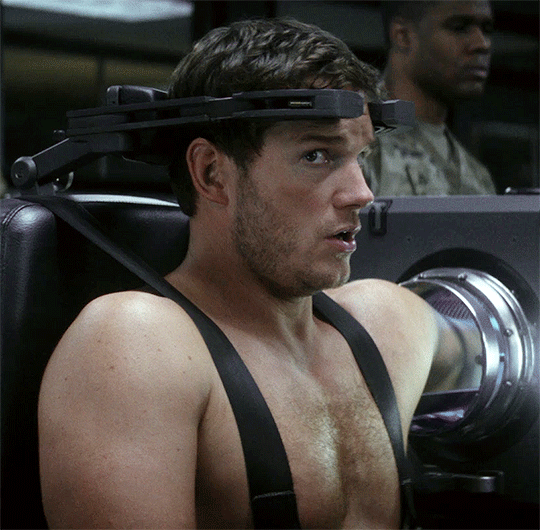
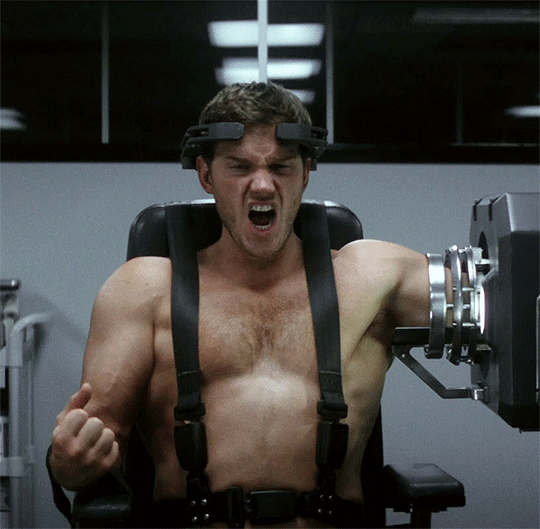




Chris Pratt as Dan Forester
The Tomorrow War (2021)
#Chris Pratt#Dan Forester#The Tomorrow War#userjimholden#userdylan#cprattedit#chrisprattedit#prattedit#Mine#best scene in the movie#they really knew how to use him#i will always respect them for this
597 notes
·
View notes
Note
Hi! i’m new to chengxian. so i was wondering, do you have any recs please? preferably long one shots (10k+) and set in the original location (i don’t like modern aus mostly as they are based in the us or uk). sorry for all the stipulations!
HELLO ANON AND WELCOME TO CHENGXIAN!!
I am DELIGHTED to be a source of fic recs, and I have JUST the fics for you.
First of all, I highly recommend checking out the various ao3 collections of past chengxian events, such as Chengxian Happy Ending Fest, or Chengxian Minibang 2023, Chengxian Week 2020, Chengxian Week 2021 , Our Meeting is Inevitable or The Chengxian+ Collection, which are a goldmine of wonderful fics. I'm sure you'll have no trouble finding something to your taste among them!
Now, on to my personal recommendations, under the read more because this got LONG.
Based on what you said you'd prefer, the fic all my dreams have come and gone a half a million times by iri_vail sounds like something you'd enjoy. It's a lovely post-canon shuangjie reconciliation fic, 10k words, with wonderful art. There's frogs too!
consider rivers by Lirazel, 9k, canon divergence fic with no war that rewrote my brain chemistry. Jiang Cheng wants Wei Wuxian to marry Jiang Yanli: lots of yunmeng trio feels, lots and lots and lots of pining.
after the sun sets by Artemis1000, 12k words, it's an amazing fic set during sunshot campaign, lots of hurt/comfort, lots of love and understanding and softness between our two favorite miscommunicators.
electricity between both of us by zyprexd is an absolutely incredible series of two fics that make me go feral. Past w4ngxian, tentative shuangjie reconciliation with long overdue communication, lots of feelings aknowledged and accepted, Wei Wuxian introspection.
Turn Back, Dull Earth by groundwiremantaray, 8k, canon divergence, a whole lot of fluff (with a delightful twist). Though not a oneshot, if you like to read happy times with chengxian, this is absolutely the fic for you.
this love that I most fear by Runespoor, 25k words divided in three chapters, in which a coreless Jiang Cheng has to aknowledge Wei Wuxian as his bastard brother in order for him to become sect leader, with all the relative implications. An angsty delight!
Little Sesame by Rurtle, which is an absolute must read. In which the summoning ritual goes wrong and Wei Wuxian reincarnates into a dog. Shenanigans ensue.
born of waters like blood by Artemis1000 (same Artemis as before) which is one of my absolute favorite fics of all time. Chengxian baby made of resentment and lake waters! Chengxian being dads! An unspecified number of eyes!!!! This fic is a bit shorter than the others I've recced, but absolutely worth reading.
letters from inside the storm by serein, in which everyone has a very bad time (not me though, I enjoyed this IMMENSELY), double whump with a very tentative reconciliation.
if tomorrow would ever come... by Midori_99, 17k, a reincarnation fic in which Wei Wuxian after his death reincarnates into a playful little fox and, despite his best efforts, finds himself once again in Lotus Pier, beside Jiang Cheng (and, really, there's no better place for him to be). The good, GOOD, cathartic angst right here, good food for the soul.
If you'd like EVEN MORE chengxian fics, my bookmarks are open and the fics are all ready to receive lots of love (and of course, if you like, there's my fics too, but they're only open to registered users)
Alright, that's definitely not all the fics I would like to rec, but that's about all I can fit in a single post before it becomes too long.
I suggest of course that you check out other works by the authors I listed, as they are all incredibly talented (and I really really wish I could put more of them here but I tried to contain myself with word count and setting as per your request)
Thank you for the ask anon, I hope you'll enjoy your stay in the chengxian side of fandom and I wish you a wonderful day!!
220 notes
·
View notes
Text
🐝 * ― 𝑩𝑹𝑶𝑲𝑬𝑵 𝑰𝑹𝑰𝑺 𝑺𝑬𝑵𝑻𝑬𝑵𝑪𝑬 𝑺𝑻𝑨𝑹𝑻𝑬𝑹𝑺. ( all of these are taken from the album ‘the eyes of tomorrow’ released in 2007 and 'x lover' released in 2021. feel free to adjust to better fit your muses. )
❛ you're attempting to bore me. ❜
❛ maybe we're all insane? ❜
❛ i see you enjoy this. ❜
❛ i'm feeling much better, my friend. ❜
❛ never again will i give in. ❜
❛ now fight, unless you're willing to die. ❜
❛ this is the moment i've been waiting for. ❜
❛ no doubt or fear, my view is now clear. ❜
❛ i've never felt so alive. ❜
❛ i still remember the way you said goodbye. ❜
❛ no matter how hard i try, i can't forget about love. ❜
❛ until the end of me, you'll be the death of me. ❜
❛ i dare you to cross the line again. ❜
❛ i'm waiting to be broken inside. ❜
❛ nothing from the past ever happens quite the same. ❜
❛ but i never expected that i'd underestimate my love for you. ❜
❛ i guess i'll spend another lifetime searching for a new hope. ❜
❛ it's impossible to look away. ❜
❛ i'm astonished by your absolute beauty. ❜
❛ set all your fears aside. ❜
❛ is this the part where we start our lives? ❜
❛ here comes the part where we start our lives. ❜
❛ i feel i've already been here. ❜
❛ so why does nothing make us wanna try? ❜
❛ just one touch, you can change my mind. ❜
❛ i can say the process is painless. that'd be a lie. ❜
❛ i don't have the strength to let you go. ❜
❛ deep within my soul, i've always known that you're everything i've ever needed. ❜
❛ just say the words and i'm all yours. ❜
❛ i'm scared to death of living this life without you. ❜
❛ how can this be wrong when it feels so right? ❜
❛ would you give me one more night? ❜
❛ i'll show you everything that you've ever dreamed of. ❜
❛ will you find your way home? ❜
❛ don't give up on me, i'm giving this my everything. ❜
❛ i still believe in you. ❜
❛ i'll fight any war with you and for you. ❜
❛ i wonder why i waited for you. ❜
❛ there's not a harder thing a man can do than pretend he's not in love with you. ❜
❛ i've been lost for a little while but i feel free. ❜

#rp meme#rp memes#rp prompts#roleplay meme#sentence starters#lyric starters#lyric sentence starters#rph#type: meme
765 notes
·
View notes
Text
For the Love of WIPs (Drarry style)
There's a lot of things I miss about LJ, but right up there was the weekly posting of the H/D Prophet run by @sassy-cissa and groovelover at the conclusion. It began posting in 2005 and It stopped posting in 2021. I know it was a ton of work for the mods to run it, but it truly kept Drarry fandom informed of all the one-shot fics, art released that week, and chapter updates for current Drarry WIPs, recs, etc... Also listed were the fests and what state they were in. Take a look at the links I posted above and see all the goodness. It was very centralized. *sigh happy times*
What made me think of this was I love reading Drarry WIPs but keep finding recent chapter fics that I missed while being posted and only found them completed and others that I'm currently reading but found by chance.
So, I thought I'd share the WIPs I'm keeping track of and those that have been completed recently that I've read.
Notes: Most WIPs (chapter fics) are long fics (over 50K and up to 1M). There are readers that see some lengths of completed fics and wince. That is one reason why chapters are often released weekly or whenever, so you have digestible amounts (5-15K). Sometimes as an author I feel in a Catch 22, readers don't have time to read long fics, but then won't read a WIP until completed. LOL
Below the cut are WIPs that I've read and that have been recently completed. I'll post ongoing WIPs that I'm reading tomorrow!
I'm not listing the Warning and Tags for these fics as I'll leave that up for you to decide on what to read or not. But, there are a few here that do have strong warnings in the tags and/or Author Notes.
One final note: I'm listing WIPs (chapter fics) that were posted over a time period, not completed chapter fics that were listed on one date as a whole.
OMG this is a long post!
Recently completed Drarry WIPs
Passing Stranger (53K) by @lettersbyelise This just completed yesterday! I have 2 chapters left to read. :)
Summary: Five years after the war, Harry, listless and depressed, stumbles upon Draco Malfoy playing the violin in an underground bar in Muggle London. The catch? Draco lost his memories five years ago. Ignoring his friends’ advice, Harry befriends an unwitting Draco, overlooking the fact that their mutual attraction might not survive if Draco’s memories return.
Comment: Haven't quite finished but I love, love, the Draco in this fic. You could feel that this is Draco stripped of all the heavy responsibilities he grew up with including having a bigoted father. The tension is palpable with Harry being attracted to this Draco but feeling that Draco needs to be Draco Malfoy to move forward. *ugh*.
2. The Boy from the Piano Shop (90.5K) by @soliblomst completed 2/25/24.
Summary: After going blind in a reckless attempt to avenge Ginny's death, Harry battles with severe depression. One day, he stumbles upon a quaint piano restoration shop in the heart of London and meets the owner, a kindly old man, and his introverted young apprentice, whose voice sounds strangely familiar.
As Harry and Draco slowly reconnect through private piano lessons, the small workshop becomes Harry's refuge, offering him a glimmer of hope in a world without eyes. Set five years after the Battle of Hogwarts.
Comment: I binged this fic bad!!! There is so much to love in this fic but one of the standouts is the OC Richard. You will love him, too. The gradual build up of Drarry is so well done. The dealing with Harry's depression is so raw and real. No cutting of corners. The ending was one of the best I've read in celebrating what is to come for Harry and Draco. And Draco, in the final scene will make you cry *happy tears*.
3. The Star Splitter (219K) by @oflights completed 3/22/24.
Summary: On a routine time travel assignment to the past, Draco stumbles upon 7-year-old Harry Potter and witnesses his neglect and mistreatment by the Dursleys. In the moment, there is only one solution, even if it goes against all his training as a Time Agent: he has to bring Harry back to the future with him.
In which Draco burns his life down for the sake of his former school rival.
Comment: I think I followed this one from the start as I do everything @oflights! OMG the action, the tenseness, the magical lore, the worldbuilding, and the sweetness of Draco raising young Harry will have you banging that "next chapter" button. The Drarry in this happens slowly and has its ups and downs but so so worth the wait. The bond is strong and at the end and you will recognize and cheer for this Harry who says Fuck it all, I ain't letting this go.
4. Spotlight (All Eyes on Us) (58K) by @pixiedunhoff completed 3/15/24. This is the 5th and final installment of the Dark Arts to Dance Floor Series (317K) which began posting in July '23.
Spotlight Summary: The spotlight can scorch.
“Has the wizarding world ever seen a couple quite like Draco Malfoy and Harry Potter? Though the pair remain frustratingly private and out of the spotlight, hardly ever seen in public together, our readers understandably demand to know more.
‘They’re happy together,’ Minister of Magic Hermione Granger exclusively tells the Prophet, before quickly ducking into a meeting for Squib Rights. ‘They’re so very happy.’”
- Daily Prophet, 2 February 2018
Comment: Pixie says in the notes, you may only need to read the 4th installment to completely get this fic, but hell, I say read them all. Pixie is newer to Drarry writing (longtime reader). I love the casualness and realness of the characters and how they interact. In Spotlight they so capture the feel of being backstage to a 'music rock star' (in the Muggle world) and on the rise in the magical one. As you're reading this fic, it might come across as being a lighter AU type fic, but don't be fooled there is much depth and layers upon layers to both Harry and Draco. Pixie just eases you into it. There were points that I just had to stop reading for a moment and digest exactly what was going on. Pixie will be on my Current WIP list, too!
5. Skybound (61K) by @xanthippe74
Summary: No matter how much Harry Potter wanted to believe he’d left danger behind when the war ended, it found him again anyway. All he had to do was step out his own front door on a Tuesday morning. A Drarry re-imagining of Howl’s Moving Castle.
Comment: I haven't finished this one, yet, but wanted to list it here. It's 6 chapters and I'm only 2 chapters in, but holy hell what world building and magical lore (and one very nasty curse). I'm not familiar with the original source, but that's okay. I'm very happy being carried along in one floating house! I'm a big fan of @xanthippe74 and am fully confident I'll love this as much as the author's other stories.
Okay, I'll be back tomorrow with a list of currently posting Drarry WIPs, including two stinging hot A/B/Os, but in very different ways.
Enjoy!
Rom
49 notes
·
View notes
Text
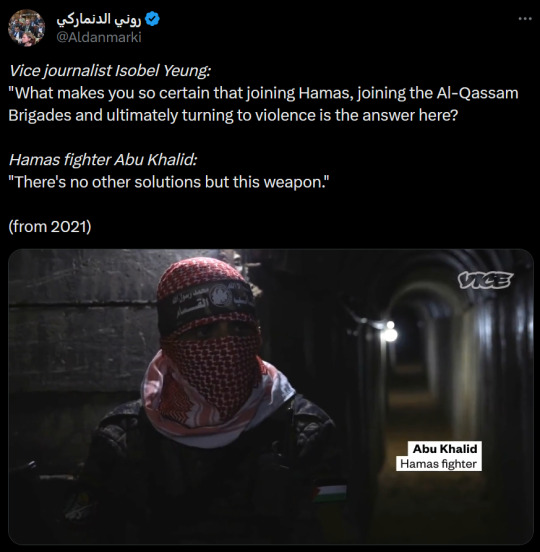
Full transcript of the interview VICE news journalist Isobel Young had with Hamas fighter Abu Khalid in 2021, following the bombing of Gaza of May of that year
Isobel Young: What makes you so certain that joining Hamas, joining the Al-Qassam Brigades and ultimately turning to violence is the answer here?
Abu Khalid: There's no solution but this weapon [his rifle]
"Abu Khalid is 25 years old. He's one of thousands who joined Hamas as a teenager and has been active in the group ever since"
IY: The fact that you're down here, in tunnels that have been built under civilian areas, launching rockets from civilian areas as well. Doesn't that mean that you're endangering Palestinians that you're claiming to be fighting for?
AK: We are sacrificing ourselves and our times and everything we do in order to ensure a better future for our children.
IY: But are you also not sacrificing the civilians that are directly above you?
AK: Of course we don't want them to get killed or get targeted, but this is the only choice we have. This is what we can do. And they are supporting us. You can't go to the sea, you can't go to the air, you can't go to anywhere. So, that's why we are building tunnels. This is the only mean which is possible for Al-Qassam brigade.
IY: Over 250 Palestinians are dead after these just eleven days. You know, 13 Israelis are dead. This is just one of so many escalations over the last few years and it's only a matter of time before the next one. What is any of this really achieving?
AK: The one who started this war was not Hamas or the Palestinians but the Israeli occupation and uhm...
IY: You guys fired the first rockets.
AK: Who said that? We warned them! We tell them not to storm our Holy Land [videos of the IDF attacking Palestinians in Al Aqsa during Ramadan in May 7] We're talking about a holy site for muslims. It doesn't mean that the first rocket being launched from Gaza started the war. The first aggression is the occupation, they stormed our home. So we'll keep going unless they Israeli stop their occupying our lands.
--
Later Isobel went to a Hamas training summer camp for teenagers.
Isobel Young: What would you say to people who would say that you are brainwashing young children and you're training them to fight?
Abu Yahia: We don't force the students to sign up for these camps. As soon as this generation was born they witnessed bombing, destruction and the panic the people of Gaza experienced.
IY: And do you think it's this kind of experiences that motivate these young people to come to training camps like these?
AY: Definitely, definitely.
--
Transcript of tweet below
Video of a Palestinian child from Gaza, wounded and crying. The tweet reads: This child's father was killed by Israel a week ago. The first thing he said while crying was that tomorrow he would enlist in the jerusalem Brigades (Al-Quds Brigades) and avenge his father against the Zionists. Israel is the one that creates these resistance fighters.

Full VICE documentary below
youtube
73 notes
·
View notes
Text

LETTERS FROM AN AMERICAN
April 21, 2024
HEATHER COX RICHARDSON
APR 22, 2024
During her confirmation hearings in 2021, Interior Department secretary Deb Haaland promised “to responsibly manage our natural resources to protect them for future generations—so that we can continue to work, live, hunt, fish, and pray among them.” Noting her Indigenous heritage, Haaland tweeted, “A voice like mine has never been a Cabinet secretary or at the head of the Department of Interior…. I’ll be fierce for all of us, our planet, and all of our protected land.”
Her approach was a shift from the practice the Interior Department had established at the beginning of the twentieth century when it began to prioritize mineral, oil, and gas development, as well as livestock grazing, on U.S. public lands. But the devastating effects of climate change have brought those old priorities into question.
Republicans, especially those from states like Wyoming, which collects more than a billion dollars a year in royalties and taxes from the oil, gas, and coal produced on federal lands in the state, opposed Haaland’s focus on responsible management of natural resources for the future and warned that the Biden administration is “taking a sledgehammer to Western states’ economies.”
On Thursday, April 18, the Interior Department finalized a new rule for a balanced management of America’s public lands. Put together after a public hearing period that saw more than 200,000 comments from states, individuals, Tribal and local governments, industry groups, and advocacy organizations, the new rule prioritizes the health of the lands and waters the Interior Department’s Bureau of Land Management oversees. Those consist of about 245 million acres, primarily in 12 western states.
The new rule calls for protection of the land, restoration of the places that have been harmed in the past, and a promise to make informed decisions about future use based on “science, data, and Indigenous knowledge.” It “recognizes conservation as an essential component of public lands management, on equal footing with other multiple uses of these lands.” The Bureau of Land Management will now auction off leases not only for drilling, but also for conservation and restoration.
Western state leaders oppose the Biden administration’s efforts to change the Interior Department’s past practices, calling them “colonial forces of national environmental groups who are pushing an agenda” onto states like Wyoming.
The timing of the Interior Department’s new rule can’t help but call attention to Earth Day, celebrated tomorrow, on April 22. Earth Day is no novel proposition. Americans celebrated it for the first time in 1970. Nor was it a partisan idea in that year: Republican president Richard M. Nixon established it as Americans recognized a crisis that transcended partisanship and came together to fix it.
The spark for the first Earth Day was the 1962 publication of marine biologist Rachel Carson’s Silent Spring, which showed the devastating effects of people on nature by documenting the effect of modern pesticides on the natural world. Her exposé of how the popular pesticide DDT was poisoning the food chain in American waters illuminated the dangerous overuse of chemicals and their effect on living organisms, and it caught readers’ attention. Carson’s book sold more than half a million copies in 24 countries.
Democratic president John F. Kennedy asked the President’s Science Advisory Committee to look into Carson’s argument, and the committee vindicated her. Before she died of breast cancer in 1964, Carson noted: "Man's attitude toward nature is today critically important simply because we have now acquired a fateful power to alter and destroy nature. But man is a part of nature, and his war against nature is inevitably a war against himself? [We are] challenged as mankind has never been challenged before to prove our maturity and our mastery, not of nature, but of ourselves."
As scientists organized the Environmental Defense Fund, Americans began to pay closer attention to human effects on the environment, especially after three crucial events. First, on December 24, 1968, astronaut William Anders took a color photograph of the Earth rising over the horizon of the moon from outer space during the Apollo 8 mission, powerfully illustrating the beauty and isolation of the globe on which we all live.
Then, over 10 days in January and February 1969, a massive oil spill off the coast of Santa Barbara, California, poured between 80,000 and 100,000 barrels of oil into the Pacific, fouling 35 miles of California beaches and killing seabirds, dolphins, sea lions, and elephant seals. Public outrage ran so high that President Nixon went to Santa Barbara in March to see the cleanup efforts, telling the American public that “the Santa Barbara incident has frankly touched the conscience of the American people.”
And then, in June 1969, the chemical contaminants that had been dumped into Cleveland’s Cuyahoga River caught fire. A dumping ground for local heavy industry, the river had actually burned more than ten times in the previous century, but with increased focus on environmental damage, this time the burning river garnered national attention.
In February 1970, President Nixon sent to Congress a special message “on environmental quality.” “[W]e…have too casually and too long abused our natural environment,” he wrote. “The time has come when we can wait no longer to repair the damage already done, and to establish new criteria to guide us in the future.”
“The tasks that need doing require money, resolve and ingenuity,” Nixon said, “and they are too big to be done by government alone. They call for fundamentally new philosophies of land, air and water use, for stricter regulation, for expanded government action, for greater citizen involvement, and for new programs to ensure that government, industry and individuals all are called on to do their share of the job and to pay their share of the cost.”
Meanwhile, Gaylord Nelson, a Democratic senator from Wisconsin, visited the Santa Barbara oil spill and hoped to turn the same sort of enthusiasm people were bringing to protests against the Vietnam War toward efforts to protect the environment. He announced a teach-in on college campuses, which soon grew into a wider movement across the country. Their “Earth Day,” held on April 22, 1970, brought more than 20 million Americans—10% of the total population of the country at the time—to call for the nation to address the damage caused by 150 years of unregulated industrial development. The movement included members of all political parties, rich Americans and their poorer neighbors, people who lived in the city and those in the country, labor leaders and their employers. It is still one of the largest protests in American history.
In July 1970, at the advice of a council convened to figure out how to consolidate government programs to combat pollution, Nixon proposed to Congress a new agency, the Environmental Protection Agency, which Congress created that December.
In honor of Earth Day 2024, Democratic president Joe Biden has called for carrying on the legacy of our predecessors “by building a greener, more sustainable planet and, with it, a healthier, more prosperous nation.”
In a statement, Biden noted that no one can any longer deny the impacts and staggering costs of climate change as the nation confronts historic floods, droughts, and hurricanes.
“Deforestation, nature loss, toxic chemicals, and plastic pollution also continue to threaten our air, lands, and waters, endangering our health, other species, and ecosystems,” he said. He noted the administration’s efforts to build a clean energy economy, providing well-paid union jobs as workers install solar panels, service wind turbines, cap old oil wells, manufacture electric vehicles, and so on, while also curbing air pollution from power plants and lead poisoning from old pipes, the burden of which historically has fallen on marginalized communities.
Biden noted that he brought the U.S. back into the Paris Climate Accord Trump pulled out of, is on track to conserve more lands and waters than any president before him, and has worked with the international community to slash methane emissions and restore lost forests.
And yet there is much more to be done, he said. He encouraged “all Americans to reflect on the need to protect our precious planet; to heed the call to combat our climate and biodiversity crises while growing the economy; and to keep working for a healthier, safer, more equitable future for all.”
Happy Earth Day 2024.
LETTERS FROM AN AMERICAN
HEATHER COX RICHARDSON
#Heather Cox Richardson#earth day#history#Letters From An American#Conservation#natural resources#Interior Department#Silent Spring#Rachel Carson
25 notes
·
View notes
Text
What makes movie action “good?”
There’s a John Wick movie in theaters. There seems to be pretty uniform agreement that John Wick movies have great action, and simultaneously, there seems to be a lot of general “Marvel fatigue,” some of which is specifically about the MCU, but also some of which is about “action blockbusters” that seem to put a lot of focus on action and spectacle that a lot of people seem to be growing increasingly disenchanted with. (See, for example: Tomorrow War (2021) starring Chris Pratt, Extraction (2020) starring Chris Hemsworth, and to round out the Chris roster we also have Wonder Woman 1984 (2020) with Chris Pine.)
Most of the discussion tends to focus on effects, and how making everything in a computer feels soulless while practical effects like the ones in John Wick and Everything Everywhere All At Once are superior, and there’s a certain degree to which blockbuster CG does look worse due to everything being computer generated. But I think a much bigger and more deep-seated problem is that blockbuster action is poorly structured.
There are a lot of great practical scenes in John Wick with choreography that is great not just in execution, but in concept: if you recreated them with computer animation, or hand-drawn animation, many of them would be just as fun. You could look at a storyboard with a director’s poorly-drawn pencil sketches and you’d still be able to follow the logic and understand what the scene’s impact is supposed to be. You can tell this, because people can describe these scenes, and regularly do exactly that, because they’re memorable. It’s what the legend of John Wick is all about. (And it’s not just the “top 10 most creative John Wick kills” listicles that remind us of that fact.)
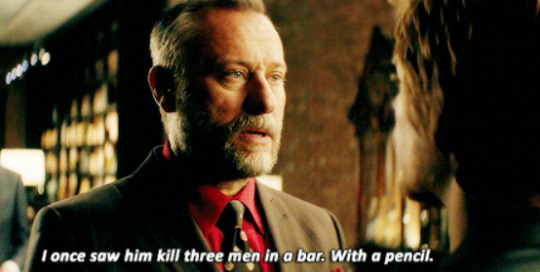
The thing is, John Wick doesn’t rely on the unique outlandish props for memorable kills. Most of John Wick’s kills boil down to “point gun, pull trigger.” And yet despite that most of his kills are with bullets, so many of them feel unique. Each scene feels like it has a tempo to it, a sense of flow, a chain of cause and effect. “That guy is hiding behind a pillar, but his toe is sticking out. So I’ll shoot him in the toe, causing him to bend over in pain, exposing the rest of his body so I can shoot center of mass.” There’s always the moment when John Wick runs empty and has to reload before delivering the killshot.
There’s a storytelling principle that’s often applied to plot structure. This was famously described by Trey Parker to a bunch of NYU students on MTVU's "Stand In." Trey Parker describes the writers room as containing a massive white board, split into 3 acts, where they write down ideas scenes and rearrange them. Each scene has to be entertaining by itself, but they also need to be connected by a coherent narrative through-line.
"You don't want just one scene where, 'well, what was the point of that?' Take the beats of your outline, and if the words 'and then' belong between those beats, you've got something pretty boring. What should happen between every beat that you've written down is either the word 'therefore,' or 'but.'”
A happens, therefore B happens. Or, B doesn't happen, but C happens, therefore D happens. Repeat. You can use this to structure the plot for a 25-minute TV episode, or a 120-minute movie, or a 2-minute action scene. Follow it, beat by beat, and see if one leads to the next:
One of the evil henchmen comes swinging at our hero with a wooden chair raised over his head, but the hero dodges and the wooden chair smashes against the floor, shattering. Therefore, the ground is now covered with the broken remains of a wooden chair, so the mook picks up one of the long pieces of wood that served as a chair leg and begins swinging at the hero again. But the hero successfully dodges and the wooden club breaks and splinters in a way that causes it to become, therefore the mook starts trying to use the splintered end to stab the hero...
I’m not saying this is an amazing action scene, but it’s a competent one: each beat flows into the next. The chair becomes a chair leg, then the chair leg becomes a shiv. Each time the henchman comes rushing at the hero, he’s doing it with a different weapon. The scene has a logic to it: if you rearranged the shots, the scene wouldn’t make sense. You can’t start with a splintered piece of wood and then end on an intact chair.
So many mediocre action movies fail to deliver it. The bad guy punches the hero. And then he punches the hero again. And then he tries to kick the hero. And then he punches in a different, cooler way. There’s no real sense in which each beat is a consequence of what followed it: if you cut the scene up and rearranged the shots, a lot of people might not even notice. (And in fact that sort of thing happens all the time in the editing bay.)
Tony Zhou self-deprecatingly describes this problem when critiquing one of his own videos, saying “This is a list you could put in any order. That’s why it’s so boring.”
For examples of action cinema where every beat feels like a consequence of what preceded it, watch any classic Jackie Chan movie (the ones that came out of Hong Kong, not Hollywood). Tony Zhou describes it like this:
“So how does Jackie create action that is also funny? First off, he gives himself a disadvantage. No matter what film, Jackie always starts beneath his opponents. He has no shoes. He’s handcuffed. He has a bomb in his mouth.“

“From this point, he has to fight his way back to the top. Each action creates a logical reaction. And by following the logic, we get a joke.” (Jackie is facing an assailant with a gun; Jackie has a gun, but it’s empty. Therefore, Jackie fakes surrender, handing his empty gun to the assailant. Therefore, the assailant is now holding an unloaded gun in his left hand. The assailant now thinks he has control of the situation, but reaching for the unloaded gun distracted him the fact that Jackie was entering a fighting stance and getting ready to kick: therefore, when Jackie kicks, he succeeds in knocking the loaded gun out of the assailant’s right hand. Therefore, the assailant tries to fire at Jackie using the gun in his left hand -- which is empty, and he realizes it in a moment of surprise which Jackie seizes on by punching the assailant in the face.)
This is the joy of watching Jackie Chan films: much like the example of a chair (which morphs into a chair leg, which morphs into a shiv), a prop in a Jackie Chan movie is rarely just one thing. A ladder isn’t just a ladder; it’s a prop. And it’s several different kinds of props. Fighting with a ladder like this:

...is subtly different than fighting with a ladder after this happens:
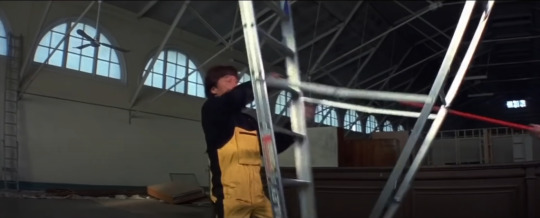
And if you flip it over a guy’s head, it suddenly becomes a cage:

...trapping a guy just long enough for him to look at you in surprise right before your fist intersects with his face.
It’s great for action comedy, but it’s also great for straight action: sometimes, the “punchline” is someone getting defeated in a surprising way. John Wick is one of the few big franchises of recent years to reliably do this sort of thing well.
Often, John Wick accomplishes this by being clever. But I think a big part of it comes down to the fact that John Wick is just mortal enough for the number of bad guy’s he’s facing to matter. Each scene needs a sense of “progress,” where the stakes are constantly changing, and sometimes the change in stakes is as simple as, “There are five bad guys, oh no!” Bang bang, pivot, bang bang. “Okay, now there are only three bad guys.” (It’s harder to do this when you’ve been injected with super soldier serum and wear a suit made of high-tech blast resistant stretch fabric: Captain America subduing five bad guys doesn’t feel meaningfully different from him subduing three bad guys, even if the way he punches them is really cool.)
Stakes matter! If threat level scales linearly with the number of bad guys on screen, then each scene will have a natural eb and flow to it as bad guys get gradually picked off (or as more of them stream into the room, or pick themselves up off the floor and reach for the gun they just dropped).
One of the MCU scenes that actually did this better than most is the famous Captain America elevator scene: first, Crossbones and two guys get onto the elevator with cap. A bit surprising. Why is that guy resting his hand on his hip so close to his gun? Several floors later, the elevator opens, and four more guys get on. They’re wearing suits, like you’d expect from people who just showed up for a day at the office. This is headquarters, there’s nothing to be worried about. So why is that guy sweating? Then, the door opens again, and three more guys get on -- and these guys are wearing tac gear. But hey, it’s Jack -- I know Jack, he was in the first ensemble movie, he can’t be one of the bad guys...so why is he standing directly between me and the door?
It’s a great example of slowly amping up the tension by gradually adjusting the threat level up. The scene even amps up the tension by having the magnetic handcuff, which leaves Cap in various stages of incapacitation throughout the fight. And he has to fight his way up from the bottom. But we very quickly go from this iconic shot:
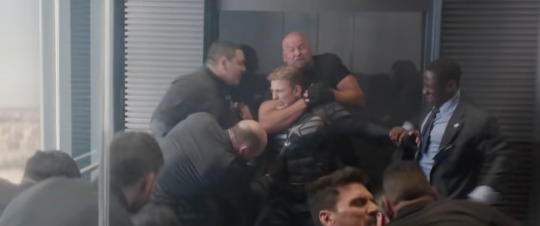
...then after literally three seconds of Cap delivering a rapid series of strikes to incapacitate most of the mooks, he’s back to fighting two or three of them at a time.
Despite there being ten bad guys in the elevator, it’s kind of hard to get a clear fix on how many of them attacking Cap at any given moment, all of the others existing in various states of injury and recovery after they get the wind knocked out of them. In fact, the only shot that allows us to get a full body count is after the fight is over:
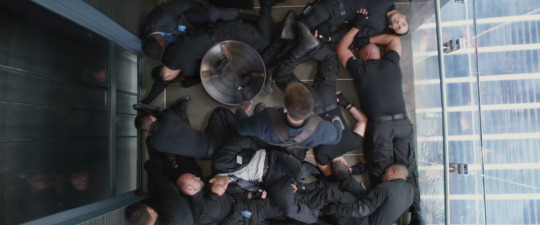
But it’s still a fun scene, one of my favorites, succeeding at being fun and memorable.
The bigger issue is the need to be “epic”: threat level can’t scale linearly with the number of bad guys on screen when you want a scene where there are literally hundreds of enemies to fight off.
There’s a certain point at which the marginal effect of another bad guy on screen is effectively zero. Obviously, this is the case when you have hundreds or dozens of enemies on screen, but there’s a real sense in which “group of seven bad guys” doesn’t feel different from “group of six bad guys.” Our brains just categorize both as “a pretty big cluster.” Research tends to come to slightly different results on this, but it seems like humans count “one, two, three, four, many.” Once you have five bad guys on screen, adding a sixth bad guy doesn’t do anything to change the stakes. (That’s the problem with having a hero who’s so strong that you need to throw 10 bad guys at him to pose any threat.)
If you cap the total number of on-screen bad guys at five, then each enemy the hero defeats meaningfully changes the stakes, and John Wick does this a lot. In many cases, the flow just comes from watching the number of bad guys on screen decrease linearly as the hero picks them off, one by one. It gives the scene a natural scenes of progress, and it can sometimes be played for comedy, like Neal Stephenson does in Snow Crash in a scene described by a sniper’s dialog:
"It's, like, one of them drug dealer boats," Vic says, looking through his magic sight. "Five guys on it. Headed our way." He fires another round. "Correction. Four guys on it." Boom. "Correction, they're not headed our way anymore." Boom. A fireball erupts from the ocean two hundred feet away. "Correction. No boat."
That’s a (very short) scene with flow. You can’t rearrange the beats; every beat leads to the next. Follow the logic, and arrive at the punchline.
244 notes
·
View notes